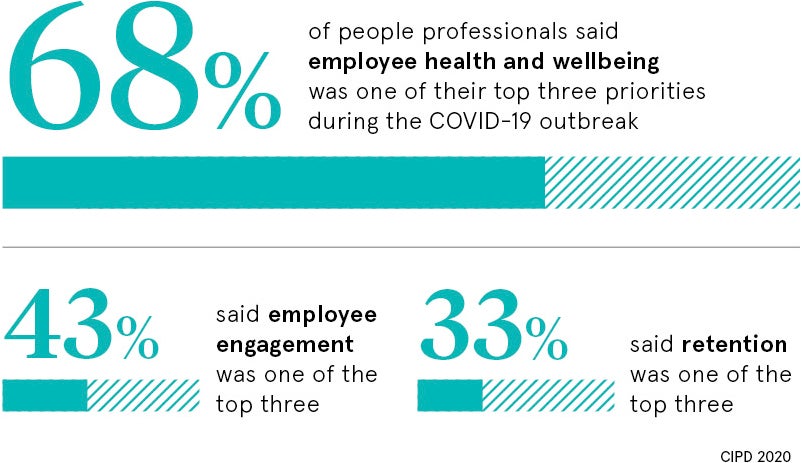
Has 2020 been the toughest year ever for human resources professionals? Many experts think it has, with the coronavirus pandemic presenting threats to both employees’ job security and wellbeing, as well as driving major organisational change with very little time to prepare.
In a period when remote working has become normal and negatively impacted the physical and mental health of the teams they look after, the key question is: who is taking care of the carers to prevent HR burnout?
The dangers are very real, as a survey for VMware suggests. Of the 950 HR directors in the Europe, Middle East and Africa region surveyed, 51 per cent worried relationships with their team and other colleagues would suffer as a result of remote working. A third admitted they felt more of a need to be online outside their normal working hours, while 28 per cent reported stress levels had increased as a result of this new pattern.
Research from HR consultancy LHH in UK and Ireland was even starker, showing 93 per cent of HR decision-makers feel more pressure than ever before.
Laura Welsh, head of HR at LHH, says: “HR professionals are being looked to by anxious employees and leadership teams during this difficult time, and are having to take part in decisions that require emotional intelligence, resilience and empathy. If HR professionals don’t look after themselves, it can have an adverse impact on their ability to make these decisions. They should apply their own oxygen mask first.”
Suggesting regular check-ups and one-to-ones, as well as being strict with boundaries, Welsh says these things are vital to “creating a safe space to express your feelings and discuss any issues that arise”.
Long-term HR management to avoid burnout
For many, this may be easier said than done. Charles Alberts, head of health management at global professional services firm Aon, believes human resources needs to look outside itself for the answer to HR burnout.
“There are various reasons for this, not least the stress we place ourselves under in recognising the significance and impact of our work on others and an expanding remit to provide greater support to people in the business.”
Alberts describes it as “vicarious stress”. “When we listen to others and how they are feeling, such as stressed, anxious, depressed, we run the risk of taking those feelings on ourselves and feeling overwhelmed.
“We may not take action to look after ourselves because we perceive what we’re going through to be not quite as bad as those whom we have supported.”
Supervision is one answer, similar to that received by counsellors and psychotherapists. “We don’t currently adopt this practice as standard for HR, line managers or mental health first aiders but, given the changing nature of these roles and increased emotional demands, we would be missing an opportunity not to adopt supervision principles that are common practice in clinical settings,” he says.
Clinical psychologist Dr Nick Taylor, co-founder of Unmind, agrees. He says: “It’s crucial we support HR professionals or the productivity and wellbeing of the organisation could suffer. Organisations must embrace technology, investing in mental health platforms and tools that allow HR teams to learn about their own mental health proactively.
“It’s important to ensure they too have an accessible and non-judgmental place to turn if they need support, so they can continue to deliver support for the workforce.”
“It’s important to ensure they too have an accessible and non-judgmental place to turn if they need support, so they can continue to deliver support for the workforce.”

Working environments must consider employees’ feelings
According to Culture Amp’s HR for HR survey of more than 1,000 HR professionals in June, just 34 per cent of respondents felt able to switch off from work to make time for rest and only 43 per cent felt their levels of stress were manageable.
This could be why Peter Ryding, founder of the HRD PathFinder Club for senior HR professionals, says he has seen an increase in HR directors seeking external networks, coaches or mentors to discuss professional or wellbeing issues.
Other measures include the chief executive or C-suite offering HR professionals unpaid leave or greater levels of flexible working to combat burnout, alongside better access to employee assistance programmes. Additionally, the chance to outsource work and redeploy staff from other parts of the business to assist temporarily or permanently could help reduce strain.
But it is cultivating a positive culture around mental health from the top down that will ultimately open up channels of check-in and communication so HR teams can signal if they are struggling.
Chartered psychologist Lucinda Carney, founder of Actus, a virtual HR software platform, says: “HR professionals have been thrown in at the deep end, entering uncharted territory almost overnight, and often without training. It has been HR who have had to keep teams together, ensuring the cogs are still turning in organisations, while dealing with ever-changing business challenges and employee legislation. This sort of burden has begun to take its toll.”
HR consultant Lesley Richards, head of the Chartered Institute of Personnel and Development in Wales, firmly agrees, but suggests such sorely needed change is appearing slowly over the horizon.
“In non-COVID times, the question of who provides HR support for HR people is a long-avoided issue,” she says. “But colleagues are now regularly asking after each other’s wellbeing. More compassionate and understanding leadership, supported by campaigns such as #bekind or #hrtogether, will be a legacy of the pandemic.”

Has 2020 been the toughest year ever for human resources professionals? Many experts think it has, with the coronavirus pandemic presenting threats to both employees' job security and wellbeing, as well as driving major organisational change with very little time to prepare.
In a period when remote working has become normal and negatively impacted the physical and mental health of the teams they look after, the key question is: who is taking care of the carers to prevent HR burnout?
The dangers are very real, as a survey for VMware suggests. Of the 950 HR directors in the Europe, Middle East and Africa region surveyed, 51 per cent worried relationships with their team and other colleagues would suffer as a result of remote working. A third admitted they felt more of a need to be online outside their normal working hours, while 28 per cent reported stress levels had increased as a result of this new pattern.
